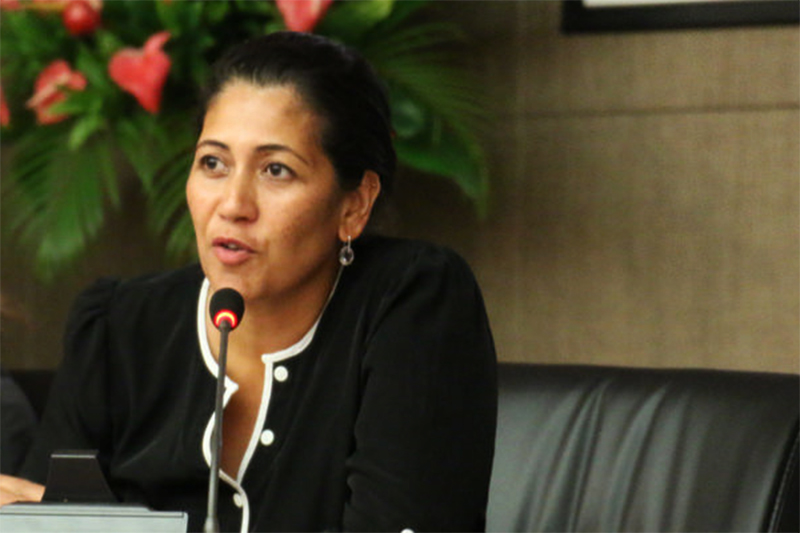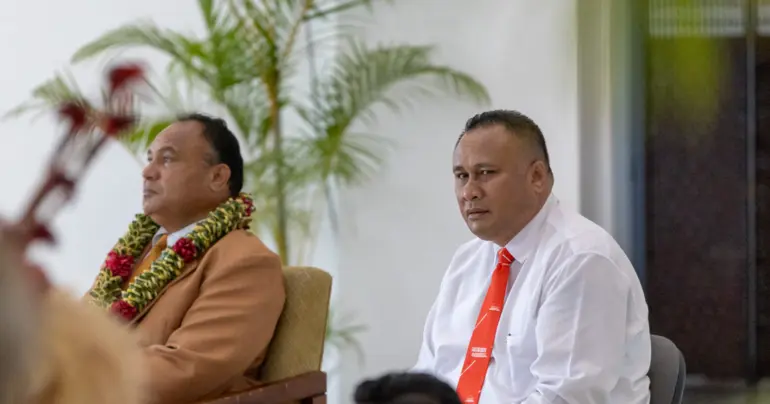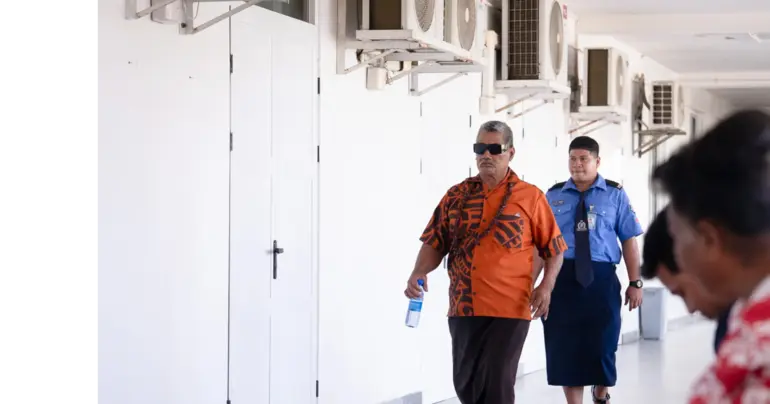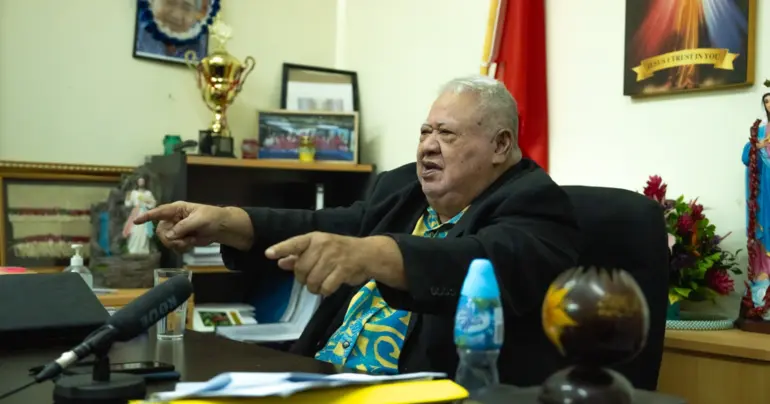Justice dismisses lawsuit over use of Stowers name
A defamation lawsuit over the use of the name Stowers has been dismissed by the Supreme Court.
The decision was delivered by Supreme Court Justice Tafaoimalo Leilani Tuala-Warren in the defamation lawsuit filed against one Julieanne Stowers and TV1.
The lawsuit was filed by Muliau Matulino Stowers, Tupa’i Farani Stowers and Afa Mulitalo Poe, who were represented by lawyer, Shane Wulf.
Julieanne, who is named first defendant, was represented by Alex Su’a while Leota Tima Leavai stood in for TV 1, which is second defendant in the suit.
According to the ruling, the families of the plaintiffs and the first defendant are neighbours in Lano, Savaii. They all live on Stowers land. Around the 1990s and into the early 2000s, the plaintiffs started using the surname “Stowers”.
“The first defendant and her family, who are ‘Stowers’, object to this because they say they have no connection by blood, marriage or adoption to the plaintiffs. The plaintiffs maintain that they are ‘Stowers’.
“In August 2015, the first defendant took a notice to TV1, which was broadcasted on its Lali programme on 20 and 21 August 2015. The notice was to the plaintiffs to cease using the surname ‘Stowers’.
“The plaintiffs then in turn sued the first defendant, Julieanne and TV1 for defamation. The plaintiffs plead in their defamation suit that as a result of the publication of the notice, the reputation of the plaintiffs has been seriously damaged and they have suffered considerable distress and embarrassment.
“The plaintiffs sought for punitive damages is pleaded on the basis the defendants did not confirm the correctness of their assertions before publication, publishing the notice twice despite plaintiff’s demand to stop publication, publishing the names of the plaintiffs and the villages in which they are serving as ministers of religion shows that they were motivated by malice, refusing to provide the plaintiff with a written copy of the published notice, and the first defendant, through her solicitor, sent police officers to serve a letter on plaintiff causing further stress and embarrassment to the plaintiffs.
“They sought $600,000 in general damages, $400,000 for punitive damages and costs of the action.”
In response, Julieanne noted the notice was fair publication of what was advised by writing by the Registrar of Births, Deaths and Marriages.
The notice was qualified by truthful information that was presented by the first defendant and her family to the Registrar, and the notice was the truth that the plaintiffs have no connection by blood, marriage and adoption to the Stowers family yet they are using the Stowers surname.
The TV1, in their respective response, stated it has a professional duty only to make sure that any statements, notices etc. broadcasted are not indecent, improper or unlawful.
“Its duties as a broadcaster are not extended to confirming whether assertions, innuendos, implications, meanings, circumstances etc. of notices are correct or defamatory to anyone.
“It is not only an impractical, extremely difficult but unreasonable expectation. It is normal for notices to be run on air twice a night. It did the same for the plaintiff’s notice. It denies continuing to publish the broadcast after the plaintiff demanded it to stop the publication.
“The TV 1 had no knowledge of the first defendant, the plaintiffs or any of the Stowers family and published the notice because it was through a paid customer the first defendant. It therefore denies any ill-feeling or malice when it published the notice.
“TV1 informed the plaintiff that it needed permission from the customer before it could release the contents of the notice to them.”
Justice Tafaoimalo pointed out that given the defendants do not dispute the imputations pleaded; there is no need to dwell on this issue.
“The test as to whether the imputations are defamatory is, would the words tend to lower the plaintiff in the estimation of right thinking members of society generally? In this case it is not necessary to go beyond the words themselves.
“The imputations of using a surname illegally, being dishonest, deceiving, untruthful and untrustworthy are clearly imputations that would lead to right thinking members of our society to think less of the plaintiffs who are all ministers of religion. Quite simply the imputations are of a defamatory nature.
“There is also no dispute that the defendants published the notice which is the matter complained of. The first defendant gave it to the second defendant to broadcast, which the second defendant did twice on its Lali programme. In relation to the submission of the second defendant about publishing, I will briefly address the issue of publication to avoid any doubt.
“It is accepted that any person who has authorised or participated in the publication of a libel is treated as publishing the libel and hence is liable in his own right. In the result, the defendants are both liable for the defamation, unless there is a distinct ‘affirmative’ defence available to either of ovr both of them. It is for them to establish such a defence.”
According to Her Honour, there are three major discrepancies in the facts between the parties.
“The first is whether John Stowers was married to Maria Toga Sua, according to the plaintiffs or Maria Toga Vui according to the first defendant.
“The second is whether the Sua title came from Maria Toga Sua according to the plaintiffs or given to Harry Stowers by the village of Saipipi, which he then gave to Paulo, according to the first defendant.
“The third discrepancy is whether Charles Stowers married Kalifonia Cecilia and had one son who is Sua Paulo according to the plaintiffs or married Silifono and had five children who are Vui Ausai, Kegikegi, Koke, Faapisa and Pelesauma, according to the first defendant.
“The plaintiffs submit that the evidence of Meipo is not credible. However, I find the most credible evidence came from Silifono Vui and Meipo.
“The plaintiff’s father, Matulino, was born in 1975, Afa Poe was born in 1968 and Farani Poe was born in 1958. Meipo is 79 years old and has lived in Lano her whole life.
“Silifono Vui is the granddaughter of Charles Stowers, her father Vui Ausai being the son of Charles Stowers and Silifono. Silifono Vui says her grandfather Charles or Sale did not have a son Sua Paulo and he is not her father’s brother. She says Silifono is Charles’ wife.
“Silifono would be her grandmother and the closeness of this connection makes her evidence as to her grandmother’s name reliable and credible. Furthermore, Sua Paulo would be her father’s brother and therefore her uncle if the evidence of the plaintiffs is to be accepted.
“However, she says Sua Paulo is not her father’s brother and the Court finds this reliable evidence given she is the granddaughter of Charles Stowers, a fact I accept as Silifono was consistent and convincing.
“Silifono’s evidence that her father is Vui Ausai the son of Charles Stowers is consistent with the evidence of Meipo and Vui Aileone that Vui Ausai, not Sua Paulo, is the son of Charles Stowers.”
After a six-day hearing, Justice Tafaoimalo concluded the evidence of the first defendant and her family reliable and credible.
“The onus was on the first defendant to prove that the allegations are true. The first defendant did not have to prove the truth of each and every fact.
“She is in this case able to defeat the claim as she has justified the substance of the allegation, or what is commonly referred to as the ‘sting’ of the libel, that is that the plaintiffs are not Stowers.
“The defence of justification or truth is established on the balance of probabilities to the satisfaction of the Court.
“The first defendant has proved that the notice taken as a whole was in substance true. I find it is true as it is based on evidence, which I have found reliable, plausible and credible,” ruled Her Honour.
According to Justice Tafaoimalo, TV1 is involved in this matter as the publisher of the notice.
“They submit that if the first defendant is successful in proving its defences of truth and fair comment, a domino effect on the claim against the second defendant should be established.
“The second defendant relies on section 8(6) (b) Defamation Act 1992/1993 and submits it exercised reasonable care in relation to the publication.
“The notice came with a letter from the Registrar of B.D.M. dated 8 May 2015 that he had cancelled records of Charles and Paulus Stowers.
“It is submitted that the second defendant does not have malicious or ill-purported motives against the plaintiffs. It is further submitted that it was not practical to contact persons named in the notice and unnecessary given the Registrar’s letter. The second defendant submits it will only interfere where the notice is indecent, improper or illegal.
“It is submitted that it did not breach any clause of the Code of Ethics of journalism. It is submitted that a ‘fair opportunity to respond’ refers to news items and awareness programmes.
“While there are many cases which deal with the reporting of news or a news item, I have not been able to find one in Samoa in relation to broadcasting a notice verbatim given by a paying customer to be broadcast.
“This then raises the issue that given the first defendant’s defence of justification/truth is established, which means she is not liable to the plaintiffs, does this also extend to the second defendant or is the second defendant required to establish its own defence.
“I find that in the case before me now, given that the defence of truth/justification is established by the first defendant, the second defendant can also rely on that defence and avoid liability. The second defendant cannot be liable for publishing a notice, which is found by the Court to be justified and true,” ruled Justice Tafaoimalo.
Her Honour further ruled that broadcasting a notice verbatim on a TV station, whether paid or not, does not take away from the control which the manager of the TV station has over content.
“This control of content is when he or she will interfere where a notice is indecent, improper or illegal. This means that the TV station is regarded as a publisher, not a passive instrument or mere conduit of content broadcast over the TV. Broadcasters should be mindful of this,” Her Honour pointed out.
“The cause of action of defamation against the first defendant is struck out and dismissed. The cause of action against the second defendant of defamation is struck out and dismissed.
“Counsel for the first defendant and second defendant, having successfully defended this action, are invited to submit their memoranda as to costs to the Court within seven days if they cannot agree on costs and Counsel for the Plaintiffs to reply within a further seven days. The costs were reserved for the strike out motion in which the plaintiffs were successful as against the second defendant and should also be included in the plaintiffs’ memorandum.”
Justice Tafaoimalo also acknowledged the Archdiocese of Samoa and Father Fereti for allowing them to view their original records as well as B.D.M. for the original records brought into Court.
“I also acknowledge the plaintiffs and the first defendant’s families for allowing us to participate in a site visit which was extremely helpful in understanding the evidence which was given in Court.”
During her verbal ruling, Justice Tafaoimalo urged the parties to “make peace” as they are after all a family.
The same sentiments were echoed by Su’a and Leavai who represented the defendants in the case.











